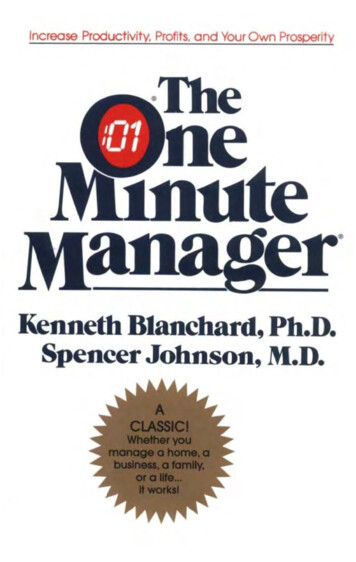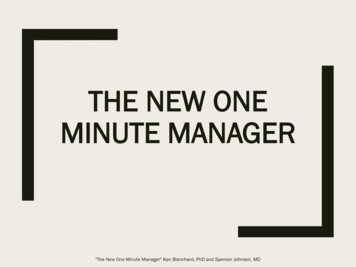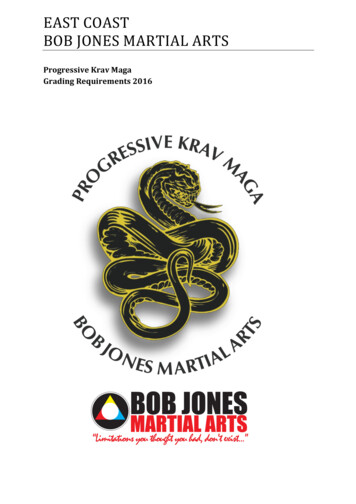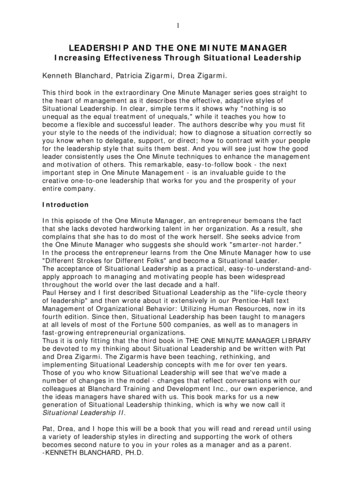
Transcription
This Berkley book contains the complete text of the original hardcoveredition.THE ONE MINUTE MANAGERA Berkley Book / published by arrangement with William Morrow andCompany, Inc.PRINTING HISTORY William Morrow and Company editionpublished 1982 Berkley trade paperback edition / October 1983All rights reserved. Copyright 1981, 1982 by Blanchard FamilyPartnership and Candle Communications Corporation. This book maynot be reproduced in whole or in part, by mimeograph or any othermeans, without permission. For information address: William Morrowand Company, Inc. 105 Madison Avenue, New York, New York10016.ISBN: 0-425-09847-8A BERKLEY BOOK TM 757,375 Berkley Books are published byThe Berkley Publishing Group, 200 Madison Avenue, New York, NewYork 10016. The name “BERKLEY” and the “B” logo are trademarksbelonging to Berkley Publishing Corporation. PRINTED IN THEUNITED STATES OF AMERICA50 49 48
ContentsThe SearchThe One Minute ManagerThe First Secret: One Minute GoalsOne Minute Goals: SummaryThe Second Secret: One Minute PraisingsOne Minute Praisings: SummaryThe AppraisalThe Third Secret: One Minute ReprimandsOne Minute Reprimands: SummaryThe One Minute Manager ExplainsWhy One Minute Goals WorkWhy One Minute Praisings WorkWhy One Minute Reprimands WorkA Gift to YourselfA Gift to OthersAcknowledgmentsAbout the Authors2
The SymbolThe One Minute Manager‟s symbol—a one minutereadout from the face of a modern digital watch— isintended to remind each of us to take a minute out of ourday to look into the faces of the people we manage. Andto realize that they are our most important resources.3
4IntroductionIn this brief story, we present you with a great deal ofwhat we have learned from our studies in medicine and inthe behavioral sciences about how people work best withother people.By “best,” we mean how people produce valuable results,and feel good about themselves, the organization and theother people with whom they work.This allegory, The One Minute Manager, is a simplecompilation of what many wise people have taught us andwhat we have learned ourselves. We recognize theimportance of these sources of wisdom. We also realizethat the people who work with you as their manager willlook to you as one of their sources of wisdom.We trust, therefore, that you will take the practicalknowledge you gain from this book and use it in yourdaily management. For as the ancient sage, Confucius,advises each of us: “The essence of knowledge is, havingit, to use it.”We hope you enjoy using what you learn from The OneMinute Manager and that, as a result, you and the peopleyou work with will enjoy healthier, happier and moreproductive lives.Kenneth Blanchard, Ph.D.Spencer Johnson, M.D.
This page intentionally left blank5
The SearchONCE there was a bright young man who was looking foran effective manager.He wanted to work for one. He wanted to become one.His search had taken him over many years to the farcorners of the world.He had been in small towns and in the capitals ofpowerful nations.He had spoken with many managers: with governmentadministrators and military officers, constructionsuperintendents and corporate executives, universitypresidents and shop foremen, utility supervisors andfoundation directors, with the managers of shops andstores, of restaurants, banks and hotels, with men andwomen—young and old.He had gone into every kind of office, large and small,luxurious and sparse, with windows and without.He was beginning to see the full spectrum of how peoplemanage people.But he wasn‟t always pleased with what he saw.He had seen many “tough” managers whose organizationsseemed to win while their people lost.Some of their superiors thought they were goodmanagers.Many of their subordinates thought otherwise.6
As the man sat in each of these “tough people‟s” offices,he asked, “What kind of a manager would you say youare?”Their answers varied only slightly.“I‟m an autocratic manager—I keep on top of thesituation,” he was told. “A bottom-line manager.” “Hardnosed.” “Realistic.” “Profit-minded.”He heard the pride in their voices and their interest inresults.The man also met many “nice” managers whose peopleseemed to win while their organizations lost.Some of the people who reported to them thought theywere good managers.Those to whom they reported had their doubts.As the man sat and listened to these “nice” people answerthe same question, he ve.”“Supportive.” “Considerate.” “Humanistic.”He heard the pride in their voices and their interest inpeople.But he was disturbed.It was as though most managers in the world wereprimarily interested either in results or in people.The managers who were interested in results oftenseemed to be labeled “autocratic,” while the managersinterested in people were often labeled “democratic.”The young man thought each of these managers—the“tough” autocrat and the “nice” democrat—were only7
partially effective. “It‟s like being half a manager,” hethought.He returned home tired and discouraged.He might have given up his search long ago, but he hadone great advantage. He knew exactly what he waslooking for.“Effective managers,” he thought, “manage themselvesand the people they work with so that both theorganization and the people profit from their presence.”The young man had looked everywhere for an effectivemanager but had found only a few. The few he did findwould not share their secrets with him. He began to thinkmaybe he would never find out what really made aneffective manager tick.Then he began hearing marvelous stories about a specialmanager who lived, ironically, in a nearby town. He heardthat people liked to work for this man and that theyproduced great results together. The young man wonderedif the stories were really true and, if so, whether thismanager would be willing to share his secrets with him.Curious, he telephoned the special manager‟s secretaryfor an appointment. The secretary put him throughimmediately.The young man asked this special manager when he couldsee him. He heard, “Any time this week is fine, exceptWednesday morning. You pick the time.”The young man quietly chuckled because this supposedlymarvelous manager sounded like a “kook” to him. What8
kind of manager had that kind of time available? But theyoung man was fascinated. He went to see him.9
The One Minute ManagerWHEN the young man arrived at the manager‟s office, hefound him standing and looking out of the window. Whenthe young man coughed, the manager turned and smiled.He invited the young man to sit down and asked, “Whatcan I do for you?”The young man said, “I‟d like to ask you some questionsabout how you manage people.”The manager willingly said, “Fire away.”“Well, to begin with, do you hold regularly scheduledmeetings with your subordinates?”“Yes, I do—once a week on Wednesdays from 9:00 to11:00. That‟s whyI couldn‟t see you then,” responded the manager.“What do you do at those meetings?” probed the youngman.“I listen while my people review and analyze what theyaccomplished last week, the problems they had, and whatstill needs to be accomplished. Then we develop plansand strategies for the next week.”“Are the decisions made at those meetings binding onboth you and your people?” questioned the young man.“Of course they are,” insisted the manager. “What wouldbe the point of having the meeting if they weren‟t?”“Then you are a participative manager, aren‟t you?” askedthe young man.“On the contrary,” insisted the manager, “I don‟t believein participating in any of my people‟s decision-making.”“Then what is the purpose of your meetings?”“I already told you that,” he said. “Please, young man, donot ask me to repeat myself. It is a waste of my time andyours.10
“We‟re here to get results,” the manager continued. “Thepurpose of this organization is efficiency. By beingorganized we are a great deal more productive.”“Oh, so you‟re aware of the need for productivity. Thenyou‟re more results-oriented than people-oriented,” theyoung man suggested.“No!” the manager resounded, startling his visitor. “I hearthat all too often.” He got to his feet and began to walkabout. “How on earth can I get results if it‟s not throughpeople? I care about people and results. They go hand inhand.“Here, young man, look at this.” The manager handed hisvisitor a plaque.“I keep it on my desk to remind me of a practical truth.”11
People Who FeelGood AboutThemselvesProduceGood Results12
As the young man looked at the plaque, the manager said,“Think about yourself. When do you work best? Is itwhen you feel good about yourself?Or when you don‟t?”The young man nodded as he began to see the obvious. “Iget more done when I‟m feeling good about myself,” heresponded.“Of course you do,” the manager agreed. “And so doeseveryone else.”The young man raised his index finger with new-foundinsight. “So,” he said, “helping people to feel good aboutthemselves is a key to getting more done.”“Yes,” the manager agreed. “However, rememberproductivity is more than just the quantity of work done.It is also the quality.” He walked over to the window andsaid, “Come over here, young man.”He pointed to the traffic below and asked, “Do you seehow many foreign cars there are on the road?”The young man looked out at the real world, and said, “Isee more of them every day. And I guess that‟s becausethey‟re more economical and they last longer.”The manager nodded reluctantly and said “Exactly. Sowhy do you think people are buying foreign cars?Because American manufacturers did not make enoughcars? Or,” the manager said without interrupting,“because they did not make the quality car the Americanpublic really wanted?“Now that I think of it,” the young man answered, “it‟s aquestion of quality and quantity.”13
“Of course,” the manager added. “Quality is simplygiving people the product or service they really want andneed.”The older man stood at the window lost in his thoughts.He could remember, not so long ago, when his countryprovided the technology that helped to rebuild Europe andAsia. It still amazed him that America had fallen so farbehind in productivity.The young man broke the manager‟s concentration. “I‟mreminded of an ad I saw on television,” the visitorvolunteered. “It showed the name of the foreign car, andover it came the words If you’re going to take out a longterm car loan, don’t buy a short-term car.”The manager turned and said quietly, “I‟m afraid that‟s arather good summary. And that‟s the whole point.Productivity is both quantity and quality.”The manager and his visitor began to walk back towardsthe couch. “And frankly, the best way to achieve both ofthese results is through people.”The young man‟s interest increased. As he sat down, heasked, “Well, you‟ve already said that you‟re not aparticipative manager. Just how would you describeyourself?”“That‟s easy,” he responded without hesitation. “I‟m aOne Minute Manager.”The young man‟s face showed surprise. He‟d never heardof a One Minute Manager. “You‟re a what?”14
The manager laughed and said, “I‟m a One MinuteManager. I call myself that because it takes very littletime for me to get very big results from people.”Although the young man had spoken with manymanagers, he had never heard one talk like this. It washard to believe. A One Minute Manager— someone whogets good results without taking much time.Seeing the doubt on his face the manager said, “You don‟tbelieve me, do you? You don‟t believe that I‟m a OneMinute Manager.”“I must admit it‟s hard for me even to imagine,” theyoung man responded.The manager laughed and said, “Listen, you‟d better talkto my people if you really want to know what kind ofmanager I am.”The manager leaned over and spoke into the officeintercom. His secretary, Ms. Metcalfe, came in momentslater and handed the young man a sheet of paper.“Those are the names, positions and phone numbers ofthe six people who report to me,” the One MinuteManager explained.“Which ones should I talk to?” the young man asked.“That‟s your decision,” the manager responded. “Pick anyname. Talk to any one of them or all of them.”“Well, I mean who should I start with?”“I already told you, I don‟t make decisions for otherpeople,” the manager said firmly. “Make that decisionyourself.” He stood up and walked his visitor towards thedoor.15
“You have asked me, not once, but twice, to make asimple decision for you. Frankly, young man, I find thatannoying. Do not ask me to repeat myself. Either pick aname and get started, or take your search for effectivemanagement elsewhere.”The visitor was stunned. He was uncomfortable, veryuncomfortable. A moment of embarrassed silence seemedlike an eternity.Then the One Minute Manager looked the young man inthe eye and said,“You want to know about managing people, and I admirethat.” He shook his visitor‟s hand.“If you have any questions after talking to some of mypeople,” he said warmly, “come back and see me. Iappreciate your interest and desire to learn how tomanage. I would, in fact, like to give you the concept ofthe One Minute Manager as a gift. Someone gave it to meonce and it‟s made all the difference to me. I want you tounderstand it fully. If you like it, you may want to becomea One Minute Manager yourself someday.”“Thank you,” the young man managed.He left the manager‟s office somewhat dumbfounded. Ashe passed the secretary she said understandingly, “I cansee from your dazed look that you‟ve already experiencedour One Minute Manager.”The young man said very slowly, still trying to figurethings out, “I guessI have.”16
“Maybe I can help you,” Ms. Metcalfe said. “I‟ve phonedthe six people who report to him. Five of them are hereand they have each agreed to see you. You may be betterable to understand our „One Minute Manager‟ afteryou‟ve spoken with them.”The young man thanked her, looked over the list anddecided to talk to three of them: Mr. Trenell, Mr. Levyand Ms. Brown.17
The First Secret: One Minute GoalsWHEN the young man arrived at Trenell‟s office, hefound a middle-aged man smiling at him. “Well, you‟vebeen to see the „ole man.‟ He‟s quite a guy, isn‟t he?”“He seems that way,” the young man responded.“Did he tell you about being a One Minute Manager?”“He sure did. It‟s not true, is it?” asked the young man.“You‟d better believe it is. I hardly ever see him.”“You mean you never get any help from him?” puzzledthe young man.“Essentially very little, although he does spend some timewith me at the beginning of a new task or responsibility.That‟s when he does One Minute Goal Setting.” “OneMinute Goal Setting. What‟s that?” said the young man.“He told me he was a One Minute Manager, but he didn‟tsay anything about One Minute Goal Setting.”“That‟s the first of the three secrets to One MinuteManagement,” Trenell answered.“Three secrets?” the young man asked, wanting to knowmore.“Yes,” said Trenell. “One Minute Goal Setting is the firstone and the foundation for One Minute Management. Yousee, in most organizations when you ask people what theydo and then ask their boss, all too often you get twodifferent lists. In fact, in some organizations I‟ve workedin, any relationship between what I thought my jobresponsibilities were and what my boss thought they18
were, was purely coincidental. And then I would get introuble for not doing something I didn‟t even think wasmy job.”“Does that ever happen here?” asked the young man.“No!” Trenell said. “It never happens here. The OneMinute Manager always makes it clear what ourresponsibilities are and what we are being heldaccountable for.”“Just how does he do that?” the young man wanted toknow.“Efficiently,” Trenell said with a smile.Trenell began to explain. “Once he has told me whatneeds to be done or we have agreed on what needs to bedone, then each goal is recorded on no more than a singlepage. The One Minute Manager feels that a goal, and itsperformance standard, should take no more than 250words to express. He insists that anyone be able to read itwithin a minute. He keeps a copy and I keep a copy soeverything is clear and so we can both periodically checkthe progress.“Do you have these one-page statements for every goal?”“Yes,” answered Trenell.“Well, wouldn‟t there be a lot of these one-pagestatements for each person?”“No, there really aren‟t,” Trenell insisted. “The old manbelieves in the 80-20 goal-setting rule. That is, 80% ofyour really important results will come from 20% of yourgoals. So we only do One Minute Goal Setting on that20%, that is, our key areas of responsibility—maybe three19
to six goals in all. Of course, in the event a special projectcomes up, we set special One Minute Goals.”“Interesting,” the young man commented. “I think Iunderstand the importance of One Minute Goal Setting. Itsounds like a philosophy of „no surprises‟—everyoneknows what is expected from the beginning.”“Exactly,” Trenell nodded.“So is One Minute Goal Setting just understanding whatyour responsibilities are?” the young man asked.“No. Once we know what our job is, the manager alwaysmakes sure we know what good performance is. In otherwords, performance standards are clear. He shows uswhat he expects.”“How does he do that—show you what he expects?”asked the young man.“Let me give you an example,” Trenell suggested.“One of my One Minute Goals was this: Identifyperformance problems and come up with solutions which,when implemented, will turn the situation around.“When I first came to work here I spotted a problem thatneeded to be solved, but I didn‟t know what to do. So Icalled the One Minute Manager.When he answered the phone, I said, Sir, I have aproblem. Before I could get another word out, he said,Good! That’s what you’ve been hired to solve.Then there was a dead silence on the other end of thephone.20
“I didn‟t know what to do. The silence was deafening. Ieventually stuttered out, But, but, Sir, I don’t know how tosolve this problem.“Trenell, he said, one of your goals for the future is foryou to identify and solve your own problems. But sinceyou are new, come on up and we’ll talk.“When I got up there, he said, Tell me, Trenell, what yourproblem is— but put it in behavioral terms.“Behavioral terms? I echoed. What do you mean bybehavioral terms?“I mean, the manager explained to me, that I do not wantto hear about only attitudes or feelings. Tell me what ishappening in observable, measurable terms.“I described the problem the best I could.“He said, That’s good, Trenell! Now tell me what youwould like to be happening in behavioral terms.“I don’t know, I said.“Then don’t waste my time, he snapped.“I just froze in amazement for a few seconds. I didn‟tknow what to do.He mercifully broke the dead silence.“If you can’t tell me what you’d like to be happening, hesaid, you don’t have a problem yet. You’re justcomplaining. A problem only exists if there is a differencebetween what is actually happening and what you desireto be happening.“Being a quick learner, I suddenly realized I knew what Iwanted to be happening. After I told him, he asked me to21
talk about what may have caused the discrepancy betweenthe actual and the desired.“After that the One Minute Manager said, Well, what areyou going to do about it?”“Well, I could do A, I said.“If you did A, would what you want to happen actuallyhappen? he asked.“No, I said.“Then you have a lousy solution. What else could you do?He asked.“I could do B, I said.“But if you do B, will what you want to happen reallyhappen? He countered again.“No, I realized.“Then, that’s also a bad solution, he said. What else canyou do?“I thought about it for a couple of minutes and said, Icould do C. But if I do C, what I want to happen won’thappen, so that is a bad solution, isn’t it? “Right. You’restarting to come around, the manager then said, with asmile on his face. Is there anything else you could do? heasked.“Maybe I could combine some of these solutions, I said.“That sounds worth trying, he reacted.“In fact, if I do A this week, B next week and C in twoweeks, I’ll have it solved. That’s fantastic. Thanks somuch. You solved my problem for me.“He got very annoyed. I did not, he interrupted, yousolved it yourself. I just asked you questions—questions22
you are able to ask yourself. Now get out of here and startsolving your own problems on your time, not mine.“I knew what he had done, of course. He‟d shown mehow to solve problems so that I could do it on my own inthe future.“Then he stood, looked me straight in the eye and said,You‟re good, Trenell. Remember that the next time youhave a problem.“I remember smiling as I left his office.” Trenell leanedback in his chair and looked as if he were reliving his firstencounter with the One Minute Manager.“So,” the young man began, reflecting on what he hadjust heard. .23
One Minute Goals: SummaryOne Minute Goal Setting is simply:1. Agree on your goals.2. See what good behavior looks like.3. Write out each of your goals on a single sheet ofpaper using less than 250 words.4. Read and re-read each goal, which requires only aminute or so each time you do it.5. Take a minute every once in a while out of yourday to look at your performance, and6. See whether or not your behavior matches yourgoal.24
“That‟s it,” Trenell exclaimed, “you‟re a fast learner.”“Thank you,” the young man said, feeling good abouthimself. “But let me just jot that down,” he said, “I wantto remember that.”After the young man wrote briefly in the small bluenotebook he carried with him, he leaned forward andasked, “If One Minute Goal Setting is the first secret tobecoming a One Minute Manager, what are the othertwo?”Trenell smiled, looked at his watch and said, “Why don‟tyou ask Levy that? You are scheduled to see him thismorning too, aren‟t you?”The young man was amazed. How did Trenell know that?“Yes,” the young man said as he rose to shake Trenell‟shand. “Thanks so much for your time, sir.”“You‟re welcome,” Trenell answered. “Time is one thingI have a lot more of now. As you can probably tell, I‟mbecoming a One Minute Manager myself.”25
The Second Secret: One MinutePraisingsAs the young man left Trenell‟s office, he was struck bythe simplicity of what he had heard. He thought, “Itcertainly makes sense. After all, how can you be aneffective manager unless you and your people are sure ofwhat they are being asked to do. And what an efficientway to do it.”The young man walked the length of the building andtook the elevator to the second floor. When he got to Mr.Levy‟s office, he was surprised to meet so young a man.Levy was probably in his late 20‟s or early 30‟s. “Well,you‟ve been to see the „ole man.‟ He‟s quite a guy, isn‟the?”He was already getting used to the One Minute Managerbeing called “quite a guy.”“I guess he is,” responded the young man.“Did he tell you about being a One Minute Manager?”asked Levy.“He sure did. It‟s not true, is it?” asked the young man,wondering if he‟d get a different answer from Trenell‟s.“You‟d better believe it‟s true. I hardly ever see him.”“You mean you never get any help from him?” pursuedthe young man.26
“Essentially very little, although he does spend a fairamount of time with me at the beginning of a new task orresponsibility.”“Yes, I know about One Minute Goal Setting,”interrupted the young man.“Actually I wasn‟t thinking so much about One MinuteGoal Setting. I was referring to One Minute Praisings.”“One Minute Praisings?” echoed the young man. “Arethey the second secret to becoming a One MinuteManager?”“Yes, they are,” Levy revealed. “In fact, when I firststarted to work here, the One Minute Manager made itvery clear to me what he was going to do.”“What was that?” the visitor asked.“He said that he knew that it would be a lot easier for meto do well, if I got crystal-clear feedback from him onhow I was doing.“He said he wanted me to succeed. He wanted me to be abig help to the organization, and to enjoy my work.“He told me that he would try, therefore, to let me knowin no uncertain terms when I was doing well, and when Iwas doing poorly.“And then he cautioned me that it might not be verycomfortable at first for either of us.”“Why?” the visitor asked.“Because, as he pointed out to me then, most managersdon‟t manage that way and people aren‟t used to it. Thenhe assured me that such feedback would be a big help tome.”27
“Can you give me an example of what you are talkingabout?” the young man requested.“Sure,” Levy complied. “Shortly after I started to work, Inoticed that, after my manager had done One MinuteGoal Setting with me, he would stay in close contact.”“What do you mean by „close contact‟?” asked the youngman.“There were two ways that he did it,” explained Levy.“First of all, he observed my activities very closely. Henever seemed to be very far away. Secondly, he made mekeep detailed records of my progress which he insisted Isend to him.”“That‟s interesting,” said the young man. “Why does hedo that?”“At first I thought he was spying and didn‟t trust me. Thatis, until I found out from some of the other people whoreport to him what he was really doing.”“What was that?” the young man wanted to know.“He was trying to catch me doing something right,” Levysaid.“Catch you doing something right?” echoed the youngman.“Yes,” responded Levy. “We have a motto around herethat says:28
Help PeopleReach TheirFull PotentialCatch ThemDoing SomethingRight29
Levy continued, “In most organizations the managersspend most of their time catching people doing what?” heasked the young man.The young man smiled and said knowingly, “Doingsomething wrong.”“Right!” said Levy, “Here we put the accent on thepositive. We catch people doing something right.”The young man made a few notes in his notebook andthen asked, “What happens, Mr. Levy, when the OneMinute Manager catches you doing something right?”“That‟s when he gives you a One Minute Praising,” Levysaid with some delight.“What does that mean?” the young man wanted to know.“Well, when he has seen that you have done somethingright, he comes over and makes contact with you. Thatoften includes putting his hand on your shoulder or brieflytouching you in a friendly way.”“Doesn‟t that bother you,” the young man wondered,“when he touches you?”“No!” Levy insisted. “On the contrary, it helps. I know hereally cares about me and he wants me to prosper. As hesays, the more consistently successful your people are, thehigher you rise in the organization.‟“When he makes contact, it‟s brief, but it lets me knowonce again that we‟re really on the same side.“Anyway, after that,” Levy continued, “he looks youstraight in the eye and tells you precisely what you did30
right. Then he shares with you how good he feels aboutwhat you did.”“I don‟t think I‟ve ever heard of a manager doing that,”the young man broke in. “That must make you feel prettygood.”“It certainly does,” Levy confirmed, “for several reasons.First of all, I get a praising as soon as I‟ve donesomething right.” He smiled and leaned towards hisvisitor. Then he laughed and said, “I don‟t have to waitfor an annual performance review, if you know what Imean.” Both men smiled.“Second, since he specifies exactly what I did right, Iknow he‟s sincere and familiar with what I am doing.Third, he is consistent.”“Consistent?” echoed the young man, wanting to knowmore.“Yes,” insisted Levy. “He will praise me if I amperforming well and deserve it even if things are notgoing well for him elsewhere. I know he may be annoyedabout other things. But he responds to where I am, notjust to where he is at the time. And I really appreciatethat.”“Doesn‟t all this praising have to take up a lot of themanager‟s time?” the young man asked.“Not really,” said Levy. “Remember you don‟t have topraise someone for very long for them to know younoticed and you care. It usually takes less than a minute.”“And that‟s why it‟s called a One Minute Praising,” thevisitor said, as he wrote down what he was learning.31
“Right,” Levy said.“Is he always trying to catch you doing something right?”the young man asked.“No, of course not,” Levy answered. “Just when you firststart work here or when you begin a new project orresponsibility, then he does. After you get to know theropes, he doesn‟t seem to be around much.”“Why?” the young man wondered.“Because you and he have other ways of knowing whenyour job performance is „praiseworthy.‟ You both canreview the data in the information system—the salesfigures, expenditures, production schedules, and so on.And then,” Levy added, “after awhile you begin to catchyourself doing things right and you start praising yourself.Also, you‟re always wondering when he might praise youagain and that seems to keep you going even when he‟snot around. It‟s uncanny. I‟ve never worked so hard at ajob in my life.”“That‟s really interesting,” commented the young man.“So One Minute Praising is a secret to becoming a OneMinute Manager.”“It is, indeed,” Levy said with a gleam in his eye. Heenjoyed watching someone learn the secrets of OneMinute Management.As the visitor looked at his notes, he quickly reviewedwhat he had learned about the One Minute Praising.32
One Minute Praising: SummaryThe One Minute Praising works well when you:1. Tell people up front that you are going to let themknow how they are doing.2. Praise people immediately.3. Tell people what they did right—be specific.4. Tell people how good you feel about what theydid right, and how it helps the organization andthe other people who work there.5. Stop for a moment of silence to let them “feel”how good you feel.6. Encourage them to do more of the same.7. Shake hands or touch people in a way that makesit clear that you support their success in theorganization.33
“What‟s the third secret?” the young man askedanxiously.Levy laughed at the visitor‟s enthusiasm, rose from hischair and said, “Why don‟t you ask Ms. Brown? Iunderstand you‟re planning to talk to her, too.”“Yes, I am,” admitted the youn
The One Minute Manager‟s symbol—a one minute readout from the face of a modern digital watch— is intended to remind each of us to take a minute out of our day to look into the faces of the people we manage. A










